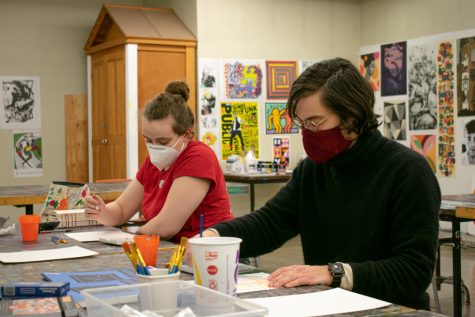Itching for insects and arthropods
July 8, 2015
Live 3-inch cockroaches crawling rapidly across your skin. A hairy tarantula cupped in your palm. Colorful Guatemalan moths displayed in a square wooden box.
Those are just a handful of the specimens included in the expansive M.T. James Entomological collection.
Last summer, some of the Cougar Quest students had the chance to explore the entomological assortment with an interactive lesson from Richard Zack, the director of the M.T. James collection. The Cougar Quest students learned about the entomological library that Washington State University offers to its students, faculty and outside scholars.
Most of the specimens originate from the Pacific Northwest. Other species originate from Guatemala, Panama, Guam, and Micronesia. Primarily, scholars conducting research in various areas donate the specimens they encounter during data retrieval to the collection.
Zack has been the curator and director of the M.T. James collection for 25 years. He received a bachelor’s degree in entomology from Ohio State, a master’s in biology from Kent State, and a Ph.D. in systematic entomology from WSU. His master’s and Ph.D. research focused on acalyptrate flies, particularly the Ephydridae (shore flies).
Zack chose to pursue higher degrees in entomology due to his interest in working with insects and working outdoors. He also believed that this field of study offered more job and research opportunities.
In his mind, entomological research overlaps with many other fields of study and contributes valuable information to society.
According to the College of Agricultural, Human, and Natural Resource Sciences’ website, entomology can contribute to agriculture, biology, chemistry, criminology, and forensics. Studying insects can help us understand pest control, environmental conservation, food production and storage, epidemiology, biological diversity, and other sciences.
“Insects are very important to society because they eat crops, they vector diseases, they’re a nuisance. And so anything that has some importance to people, especially from a negative standpoint, is important to society,” Zak said. “I mean, they at least have a lot of good aspects, but the primary reason we spend so much energy and money studying insects is because of detrimental effects.”
The M.T. James collection exemplifies how higher education is applied outside of the classroom.
“I think that from an entomological standpoint on higher education, what a subject like entomology does allow a student to pursue this interest that they have in just understanding biology and the world and to do it through insects,” Zak said. “And by doing it through insects, not only do they enhance this innate need to learn, but they are providing a pretty definite service to society because they are helping to solve some serious problems.”
During the last two weeks of July, Cougar Quest students will have a chance to visit the M.T. James collection again on a WSU campus field trip.


















